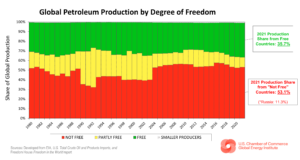Oil rents are an important concept in Middle Eastern politics, due to their impacts on various political and social outcomes in states. Simply explained, rents are what a state can extract from something just because they own it, which in this case is massive oil reserves. Frequently in this region, rents are used to maintain authoritarian control of a nation. Although their unusual size plays a factor in the repression of a population, it is largely the interaction of those rents with other factors, such as the government and economy, that allows authoritarian leaders to stay in control.

U.S Chamber of Commerce Global Energy Institute
The way that Middle Eastern governments use oil rents allows authoritarian regimes to stay in power. The Rentier Effect explains this precisely; governments use oil revenues to relieve social pressures that might otherwise lead to demands for greater accountability.
For example, because Middle Eastern governments derive so much wealth from these rents, they don’t have to tax the population. Taxation is an important part of government accountability, so without it the government acts in its own interest rather than that of its population. Another way governments use rents to stay in power is through spending on patronage. Again, instead of using the wealth derived from rents to benefit the population, governments engage in greater spending on patronage which lessens pressures for democratization. Similarly, governments can use oil rents to prevent the formation of social groups that would be able to mobilize and hold governments accountable. These are all key examples of governments manipulating rents to maintain control of a population.
The Repression Effect also shows how governments interact with rents to produce negative outcomes. Resource wealth allows governments to spend more on internal security, such as the military, and block democratic operations. This is seen in the Mukhaberat state, or intelligence agencies, that constantly monitor citizens’ actions. An example of this is Iraq under Saddam Hussein, in which opponents of the regime were detained and assassinated.
Outside of rents’ interaction with governments, they also interact directly with the economy. The expansion of the oil sector reduces the price of foreign currencies, hurting productive sectors exposed to foreign competition. This can hinder the development of an efficient private sector, which means performing poorly in agriculture and manufacturing, high levels of macroeconomic instability and inflation, low levels of job creation, and high levels of unemployment. These economic effects create public dissatisfaction, which can lead to social unrest.
Although resource-rich countries in the region directly feel the effects of oil rents, resource-poor countries are also affected by rents. Even though resource-poor labor-abundant countries may not have high amounts of oil wealth, they still send their labor force to resource-rich labor-poor countries, intertwining them and affecting them indirectly.
Therefore, although the size of oil rents plays a considerable role in the control and repression of a population, it is mostly the relationship of rents with other factors that allow for poor outcomes in the region.
Works cited:
Cammett, Diwan, Richards, & Waterbury. 2018. A Political Economy of the Middle East Fourth edition. Boulder, CO: Westview.
dietricm
September 25, 2023 — 3:06 pm
I agree that one must look beyond just the question does a country have a lot of oil when looking at the social and political outcomes in MENA. It is the interaction of these larger oil rents with other factors like how this revenue is used by the state that is also important. The idea of no representation without taxation is a compelling one in our region. How connected are people with the government, is there a developed private sector, and how much is invested in the security apparatus of the state are all very valuable things to look at in conjunction with the amount of oil a country has.
Ed Webb
September 27, 2023 — 3:58 pm
This is very thorough and quite persuasive!